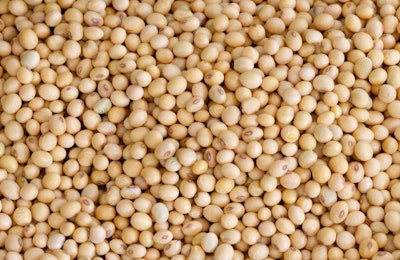
The ongoing trade war between China and the U.S., along with the outbreaks of African swine fever (ASF) in China, has huge potential to affect American soybean and pork producers, according to two economists.
Richard Brock, president of Brock Associates, and Joseph Kerns, president of Kerns and Associates, spoke May 16 at the American Feed Industry Association Purchasing and Ingredients Suppliers Conference in Orlando, Florida.
Brock said that, because China has largely been getting its soybean supply from Brazil and Argentina since its trade dispute with the U.S. began, the U.S. soybean industry stands to experience a big disruption.
“With what’s going on right now, … we’re going to just shift all of the soybean production to South America and we’re going to become the corn capital of the world. So this thing needs to be resolved quickly,” Brock said.
“This trade war and tariffs is so scary, long term, I can’t begin to explain to you,” Brock said. “I am not at all pleased with Trump’s analogy that, yeah, this it going to hurt the soybean farmers short term, but we’re going to take this tariff money and offset it as income by giving (farmers) money. That is not what a soybean farmer needs because what this is going to do to the soybean farmer long term is shift demand all to Brazil and Argentina. And once we lose this, we’re not going to get it back.
“We don’t need cash, we need exports. … Trump and this administration are not getting that,” he added.
Planting delays in Midwest
Brock said weather has so severely delayed corn planting in many Midwestern states that farmers will either have to plant soybeans instead or rely on crop insurance payouts if they are not able to plant either.
“The next 10 days are very important,” Brock said. “We’re already so late in Illinois and Indiana, a lot of the acreage is probably going to be switched to soybeans.”
This is a problem because the U.S. does not need more acreage dedicated to soybeans when one of its biggest export markets isn’t trading with it.
Supplementing China’s protein deficit
China’s Ministry of Agriculture and Rural Affairs reports that the country’s hog inventory is down 20-25% as a result of ASF, but Kerns says that number is likely much higher than reported.
“The folks that are coming back (from China) that see the devastation firsthand all have the same opinion: Forget about the 20-25%. We’re talking significant devastation,” he said.
Kerns said it will take 50% of the world’s protein trade to supplement what the Chinese government says is the protein deficit now. This shortfall will be difficult, if not impossible, to fulfill, he said. However, this huge demand for protein will benefit other protein producers, mostly chicken and beef, but also eggs and dairy.
“Given the ASF situation, chicken might be this dark horse sleeper that could really see a benefit,” he said.
But, he said the ancillary suppliers to animal agriculture, such as feed producers, “have the opportunity to be huge losers, specifically is ASF comes to the United States.”
“If we as an industry don’t stand up and take a much harder stance about what’s being imported … if the vector could have been prevented and we didn’t, who else gets a black eye?”
View our continuing coverage of the African swine fever outbreak.















